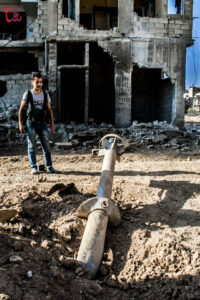
Chemical weapons use is often described in broadly referential terms by politicians who take positions on it and news sources that report it. By itself, the term chemical warfare is vague – it can describe anything from the use of a stink bomb to the dropping of a nuclear warhead. Because of this massive range in potential significance, it is a phrase that deserves intensive disambiguation. To fully understand the significance of chemical warfare, both generally and on a case-by-case basis, it’s important to approach the subject from two directions: first, what was the exact nature of a given attack and what specific chemicals were used as weapons, how much, and to what effect? Second, what is the historical context in which the attack stands– what precedents have been set to determine the consequences of similar actions? Determining the specific details of an attack and putting it in context is the only way to properly evaluate an incident of chemical warfare and justly decide the course of its aftermath.
On August 21st, 2013, the Syrian regime deployed Sarin gas in the Ghouta agricultural belt around Damascus. Sarin gas is a powerful nerve agent, a class of phosphorous-based organic compounds that disrupts the brain’s ability to send messages to the body’s organs. According to the Centers for Disease Control and Prevention (CDC), symptoms of Sarin gas can include nausea, violent headaches, impaired vision, drooling, muscular convulsion, respiratory arrest and loss of consciousness. If somebody is exposed to the gas in high enough doses, the chemical can lead to death before symptoms even arise. In reality the dose need not be that high at all – inhalation of just 200 mg can be fatal almost immediately, shutting down the respiratory center of the central nervous system and, in turn, paralyzing the muscles responsible for lung contractions. In other words, it’s not that victims choke to death on the substance– it’s that it takes away their ability to breath.
The danger of Sarin is compounded by how easily it’s spread – it can be inhaled or absorbed through the skin in its gaseous form; it can contaminate food and water supplies and infect somebody who consumes or even touches the contaminated substance; and, because it’s heavier than air, it can linger in an area for up to six hours, sinking to and spreading at ground level. On August 21st over 1400 civilians, including many children, died in Damascus. For those that didn’t, there may be permanent damage– Sarin gas can cause lasting impairment of the respiratory, ocular and central nervous systems. In addition to Sarin gas, Damascus now contains vesicants (blister agents) such as mustard gas (yperite) and possibly even VX, a nerve agent 10 times more powerful than Sarin.
President Obama was on the verge of invading Syria. He stated, more than once, that the use of chemical weapons against civilians was the red line that, if crossed, would result in American intervention in the war-torn country. Syria promised to join the Chemical Weapons Convention nearly immediately after the attack under pressure from their strongest ally, Russia, following the US threat of intervention. The CWC is an international treaty, established in 1993, prohibiting the production, stockpiling, and use of chemical weapons; in addition, it requires and monitors the safe destruction of chemical weapons in its co-signing states, a list that encompasses 98% of the world’s population. Only Burma, Egypt, Israel, North Korea, South Sudan and Angola are not participating members (the last of which, although it doesn’t have nor does it plan to produce chemical weapons, remains a non-member for logistical/economic reasons). Nonetheless, the treaty isn’t perfect – there are no real guidelines to follow or pre-established consequences in the event that a participating country breaks the rules. This is because no country has yet. In itself, this track record reflects well on the Convention, and ought to give us hope that Syria will abide by the rules as well. However, there is room for confusion and disorder the day a country chooses to stray from the group. Nonetheless, like any organizational body, the CWC is only as legitimate and successful as its members are willing to abide by the standards of conduct.
To not invade Syria was a net-positive, domestically and internationally. There are times that call for physical intervention, but in this case there was a framework of reform already in place, and it is unlikely that we would have accomplished anything more regarding Syria’s chemical weapon reduction had we invaded. However, non-intervention does not mean we should forget the issue – the reduction and ultimate abolishment of chemical weapons necessitates great political concern and is an issue on which we – the country, the world – must not let up.